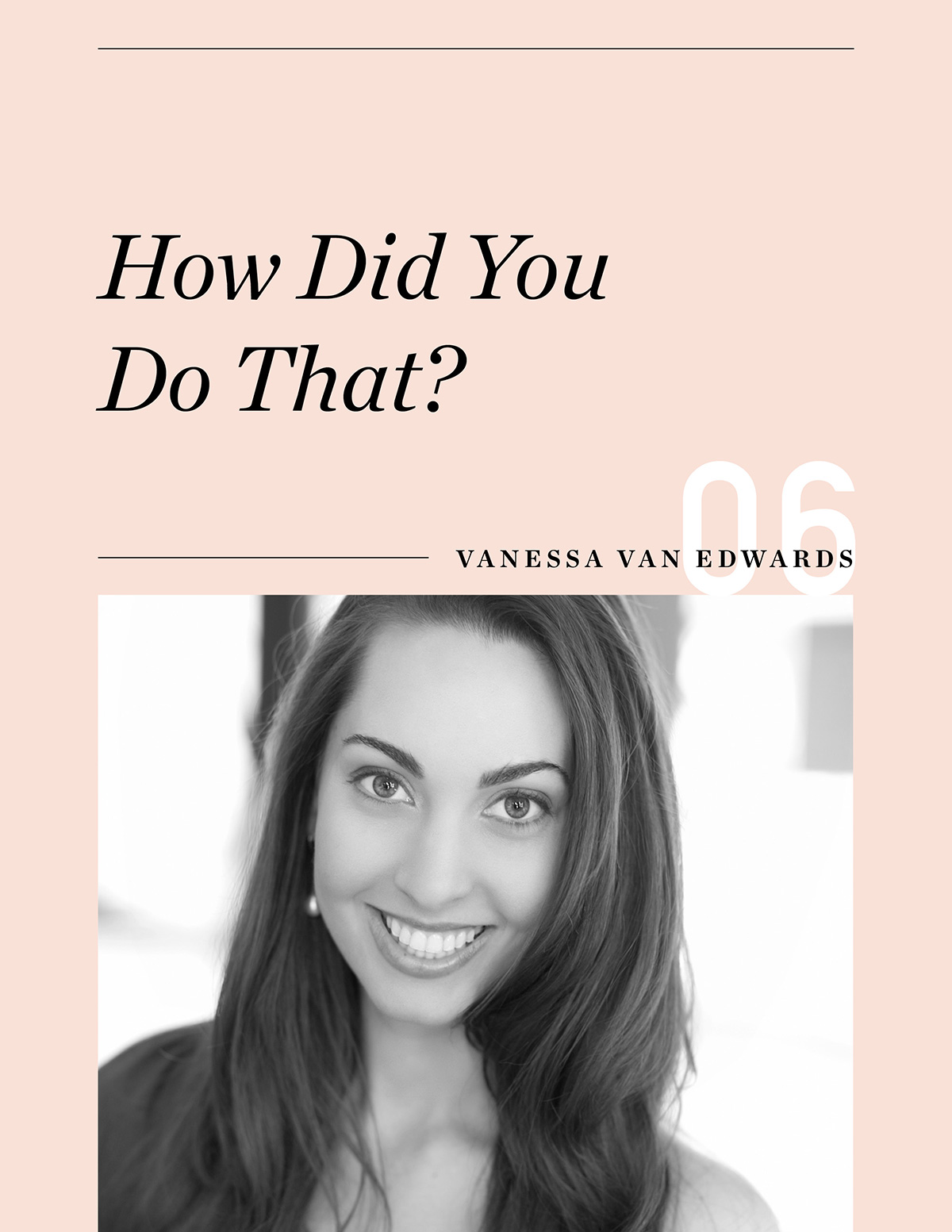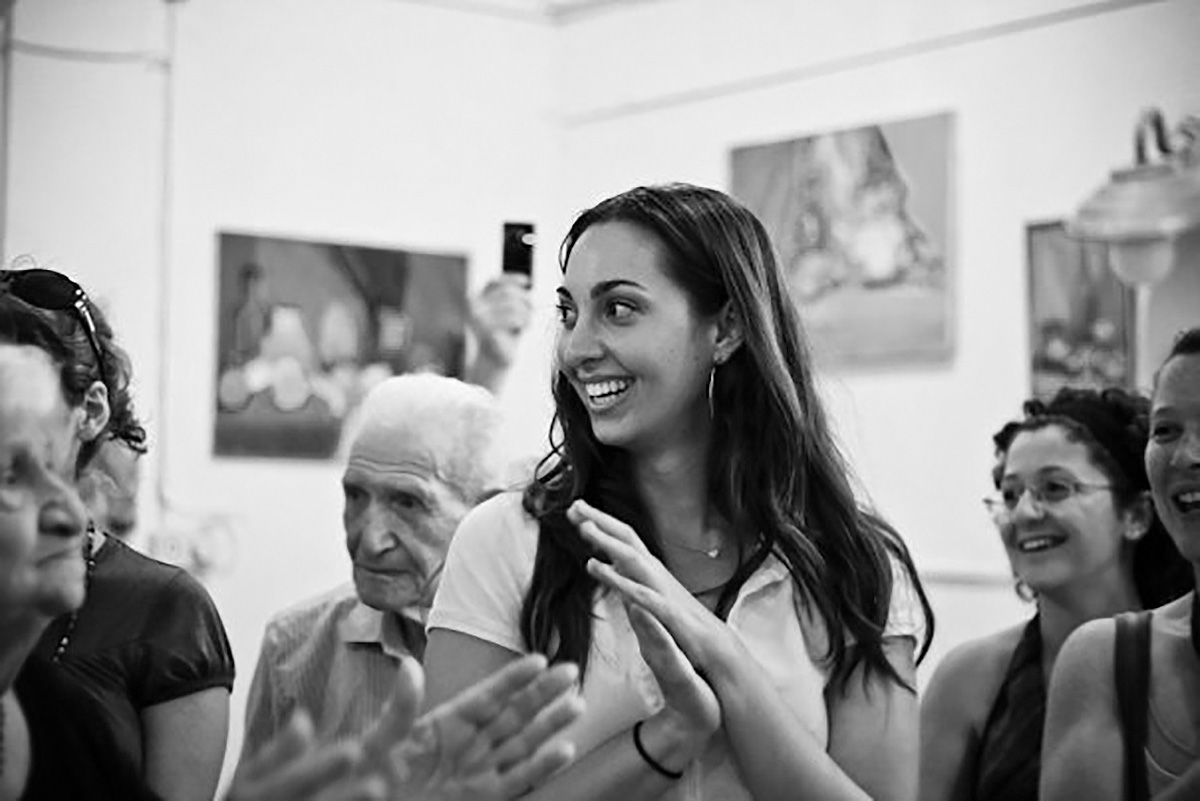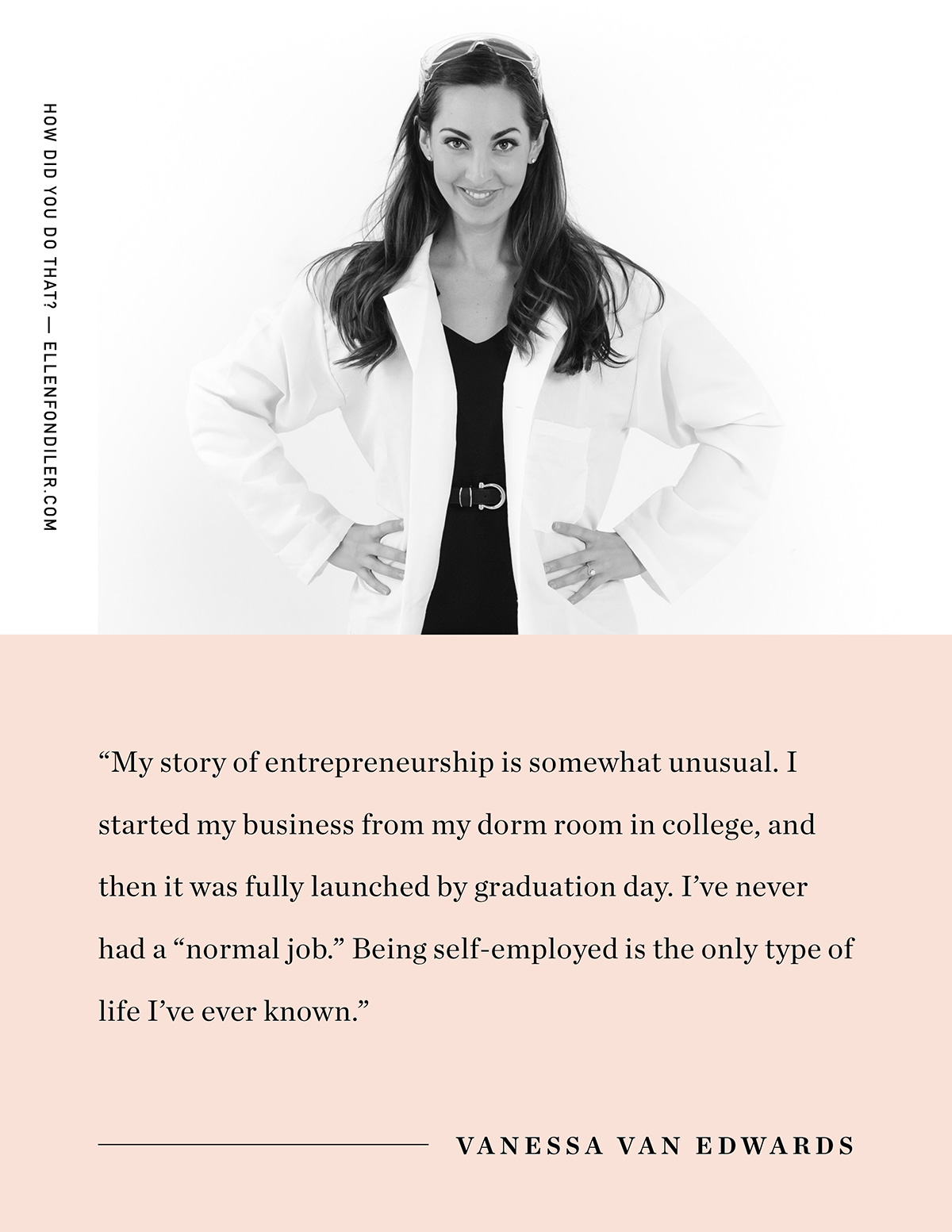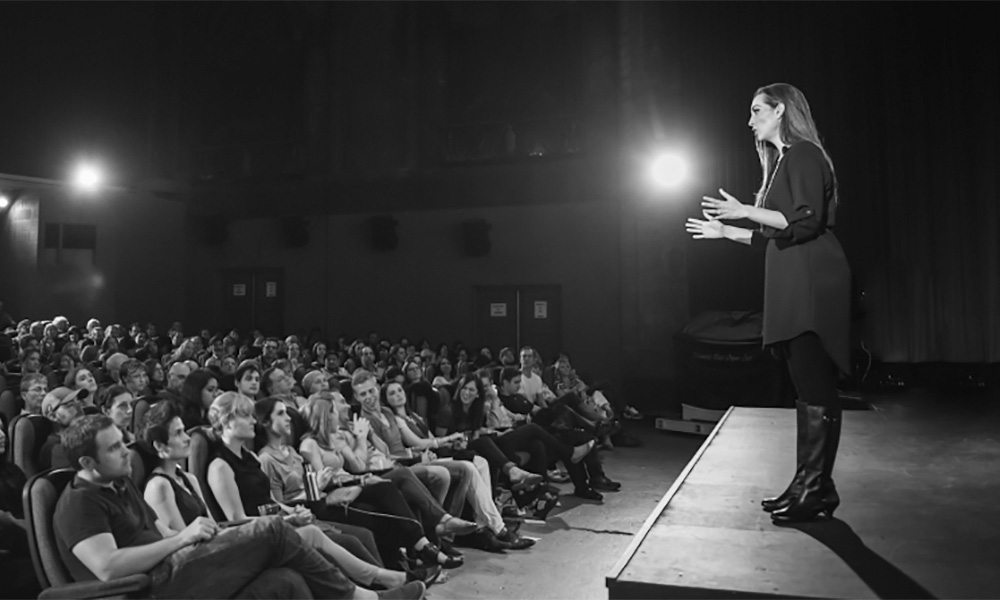
Whenever I meet someone who’s got a really cool job, who runs a thriving business, or who has completed an amazing project, I always want to know: “How did you do that?”
I’m always curious to hear the “behind-the-scenes story”—who they emailed, what they said, how they got their first client, how they got their foot in the door—the exact steps that they took to achieve their goal.
HOW DID YOU DO THAT? is an interview series where we get to hear the REAL story behind someone’s success—not the polished, neat and tidy version.
To see a complete list of all the interviews that have been completed to date, head over here.

Name: Vanessa Van Edwards
Location: Portland, Oregon
Profession: Human behavior researcher
You run a human behavior research company called the Science of People. You analyze data and then you create articles, videos, and classes on all kinds of topics—like how to detect if someone is lying, how to detect if someone is attracted to you, and how to tweak your body language to become more charismatic and memorable. Totally fascinating! I’m wondering… how did the Science of People get started? Did you wake up one morning and decide, “I’m going to study human behavior and start my own company”? How did this all come about?
I feel like I’ve been studying human behavior my whole life, because “people skills” never came naturally to me. When I was younger, I was always the quiet, chubby kid in the corner reading a book. I was very awkward and painfully shy. I wanted to make friends, but I didn’t know how. I started to observe people from a distance—trying to figure out what makes people tick, how friendships are formed, and why some people always seem so effortlessly confident and magnetic, while others don’t.
Many years later, a professor in college said to me, “Why don’t you study people like you study for your exams?” It was a concept I’d never considered before, but it intrigued me! I started making flashcards that I could use for conversation starters, and I started memorizing facial expressions and what they meant. Basically, I started studying people like I would study Mandarin or chemistry. That’s when I started to feel like I was finally understanding the people in my life.
I loved doing mini-experiments with the people around me, and creating surveys to collect data from people, and then I’d record my findings on my blog. As time rolled along, I started getting emails from readers who liked what I was sharing. I began to realize that there’s this whole niche of people who want to become more confident and charismatic, and who want practical, research-driven tips on how to do it. My company, the Science of People, was initially born out of that blog and the community of fans that it attracted.
You’ve been hired to do presentations at big companies like American Express, Dove, and Comcast. How do you typically line up those types of speaking engagements? Do you reach out to those companies and say, “Hey, I’d like to do a seminar for your employees—here’s my proposal for you”? Or do they reach out to you? Or both?
In terms of speaking engagements, I actually started out by doing presentations at schools. I’d go into high school auditoriums and PTA groups and teach kids about people skills, social and emotional intelligence—basically, everything I wish someone had taught me back when I was an awkward teenager!
Occasionally, there’d be some parents in the audience, and they’d come up to me afterward to chat. I think the first parent who came up to me was a lawyer, and he said, “I work in a law firm here in town, and I have attorneys who could use your presentation because they are very book smart, but not very people smart.”
I’d never considered doing events for grown-ups before, but it sounded interesting. I said, “Sure, I’d be happy to adapt my presentation to make it work for adults.” We scheduled a date, and that was that. I ended up doing several presentations at local law firms, and one presentation led to another. Sometimes, the lawyers would refer me to their clients, and then those clients would recommend me to other clients, and so on.
So, from the very beginning of my business, getting hired has always been driven by word-of-mouth marketing. Basically, one happy client talks to a colleague at another company and says, “Vanessa’s presentation was great. You should consider hiring her, too.” And that’s how it happens. That’s how I lined up my work with American Express and most of the other big-name companies—good old fashioned word-of-mouth referrals.
Of course, creating online content helps too! I still have a blog, and I also created a YouTube channel for the Science of People where I share science-y information but in a fun, entertaining way, with lots of terrible jokes! A lot of event coordinators and conference bookers will Google or search YouTube where they’re looking for speakers to book. They’ll often find my videos, and that’s helped me to line up presentations, too.
Let’s roll back to the very beginning of the Science of People—the first couple of months. How did it feel to launch a brand new business? Did you have fans right away? Did you have clients right away? Or did things feel “quiet” and “empty” and discouraging at first? Describe what those early days felt like for you.
My story of entrepreneurship is somewhat unusual. I started my business from my dorm room in college, and then it was fully launched by graduation day. I’ve never had a “normal job.” Being self-employed is the only type of life I’ve ever known.
I credit my mom and dad with giving me the inspiration to start my own business. Both of my parents are lawyers, and one day, they said to me, “We like being lawyers, but we don’t love it. And we get paid by the hour.” My mom said, “If I could give you one piece of financial advice, it would be to understand the concept of passive income.” She sent me to a financial seminar where I learned about passive income—which basically means, figuring out how to earn money by selling products, classes, and programs that people can purchase anytime, instead of having a regular type of job.
Using what I’d learned in that seminar as a blueprint, I set up my blog so that I could eventually create passive income revenue streams. I know, it sounds really nerdy, but to me it felt like a big adventure. I felt completed lit up and excited about the process. Plus, working on my blog felt a lot more exciting than studying for my final exams.
Throughout college, I worked on building a fan base for my blog, and then I started reaching out to local schools to see if I could speak to their students. And then, as I mentioned earlier, those school presentations often led to doing presentations for grown-ups. One thing led to another. I never really experienced a time period where I was desperate to find clients. I’ve just focused on blogging, making videos, and speaking in public as often as possible, and as a cumulative result of those efforts, clients always seem to find me.

You have a new book that was just published! It’s called Captivate: The Science of Succeeding with People. In addition to hitting the Wall Street Journal bestseller list, Captivate has been named the #1 New Release and #1 Bestseller in Popular Social Psychology & Interactions on Amazon. That’s amazing! How did you get a book deal? Did a publisher approach you and ask if you’d like to write a book? Did you write a book proposal and contact lots of literary agents? How did it happen?
I self-published a couple of books in the past. I’ve also released books through traditional publishers, too, including a book for parents and teenagers. So I was pretty familiar with the publishing industry, and I felt pretty “done” with it, actually. I didn’t want to write another book.
But then I was approached by Niki Papadopoulos at Portfolio, which is part of Penguin / Random House. She was so lovely, and she understood what Science of People was trying to do. She understood my message. And she said, “Look, let’s work on the best, most amazing book for your audience. Your audience would love a new book from you.” At first I resisted the idea, but then I realized that she was right.
Once I committed myself to the idea of writing a new book, I went “all in.” I figured, “I need to put my entire heart into this and make this book completely amazing, or not bother at all.” After I decided to go for it, everything happened really quickly. Within a month, I had an agent, a book deal, and the paperwork was signed. My lesson from that experience is that when you find people who really “get” you—and really understand and support the work you’re trying to do—then projects can move along really quickly!
What was one of the scariest or most humiliating moments of your career, and how did you get through it?
The process of writing my very first book—many years ago—was a pretty disastrous experience. With my newest book, the entire process has been exciting and fast-moving. I’ve had a supportive team and everyone is totally invested in the project. But with my first book, it was the total opposite.
Everything about that first book felt awkward and forced. I pitched my book idea to so many people, but people didn’t quite get it. I kept pitching and pitching, and I kept changing the concept based on people’s feedback. My book proposal got changed, the title got changed, the cover got changed—basically the entire book got changed into something I didn’t even like. And everything moved along at a painfully slow speed.
By the time that book hit the shelves, almost two years later, it did horribly. No one bought it. I wasn’t excited to promote it. I actually felt kinda embarrassed about it. Also, the publisher ended up using a cover design that looked very similar to another book in the same genre, so it looked like I’d plagiarized them, or they’d plagiarized me. The whole thing was a disaster.
That was such a disappointment because I really wanted that book to help people—and I didn’t achieve my goal, ’cause no one wanted to read it. That’s why I told myself I’d never do a book again unless the circumstances were completely different. Meanwhile, I did some soul searching. Reached out to friends. Put together some masterminds of people I trusted to help me with next steps. It took about 5 months to find my bearing and get through the fog of sadness and grief from the death of the book.
Ultimately, my lesson was… if you have a clear vision for a project, you can’t sacrifice your vision and change it a million times. Listen to people’s feedback, sure, but stay committed to your vision. Otherwise, you might wind up with a finished product that’s nothing like what you imagined, and it might feel really gross.

3 Things
If someone is interested in becoming a human behavior researcher like you, what are the first 3 things they should do?
1. First and foremost, be yourself. Don’t try to copy anybody else.
In the early part of my career, I tried to mirror and mimic other experts. But that didn’t work. Eventually, I found my own voice and my own way of talking about science—which is silly and goofy at times, with lots of puns and jokes! When I finally started doing things my own way, that’s when my blog, my YouTube videos, and my presentations really started taking off.
2. Come up with a clear vision of how you want to help people.
If you want to study human behavior, run a science-focused business, or any type of business for that matter, ultimately, it’s all about helping people. How do you want to help people? Start there.
Do you want to help people find true love? Do you want to teach people how to succeed in negotiations and earn more money? Do you want to teach awkward, shy kids how to build confidence and make friends? Do you want to help people overcome addiction? You don’t necessarily have to choose just one specialty. Maybe you’ll have a couple specialties. But you need to have some type of mission driving your work.
3. Pick your favorite mediums.
Some people love making videos and speaking onstage—like me! Other people love working with clients 1-on-1 or in small groups. Other people love podcasting, or building online communities, or developing programs for companies, and so on.
You don’t have to do everything. Choose the mediums that feel exciting to you and that will serve your clients best. Stick with those. Again, it all circles back to being yourself. With any type of business, it’s only going to work if you’re having fun and if you’re tapping into your natural strengths.
Don’t force yourself into a box that doesn’t fit. Make your own custom box.
ONE MORE THING…
Do you have “one more quick question” that you’d like to ask Vanessa? Email me and tell me what you want to know! I might choose your question for my ONE MORE THING… Podcast (Coming soon!!!)
YOUR #1 CAREER GOAL: ACHIEVED
Do you need some encouragement to help you achieve a big, daunting career goal? Would you like to have a career coach/strategist in your corner—feeding you ideas that you’d never considered before, helping you figure out who to contact, and what to say, and checking in to make sure you don’t procrastinate? If so… click here to find out how we can work together. I’d love to coach you!
![]()
